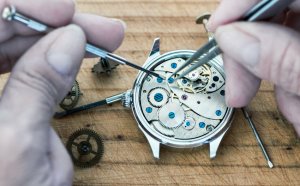
How Grandfather clocks work
Pendulum clocks have been used to keep time since 1656, and they have not changed dramatically since then. Pendulum clocks were the first clocks made to have any sort of accuracy. When you look at a pendulum clock from the outside, you notice several different parts that are important to the mechanism of all pendulum clocks:
- There is the face of the clock, with its hour and minute hand (and sometimes even a "moon phase" dial).
- There are one or more weights (or, if the clock is more modern, a keyhole used to wind a spring inside the clock - we will stick with weight-driven clocks in this article).
- And, of course, there is the pendulum itself.
In most wall clocks that use a pendulum, the pendulum swings once per second. In small cuckoo clocks the pendulum might swing twice a second. In large grandfather clocks, the pendulum swings once every two seconds. So, how do these parts work together to keep the clock ticking and the time accurate? Let's take a look at the weight, first.
Share this Post
Related posts
How Clocks Work
Students are introduced to the elements necessary to keep track of time, and they are also exposed to a variety of time pieces…
Read MoreWork Clocks
Simple punch-in/punch-out clock & widget for tracking the time at work. Features (very partial list): * Overtime…
Read More










